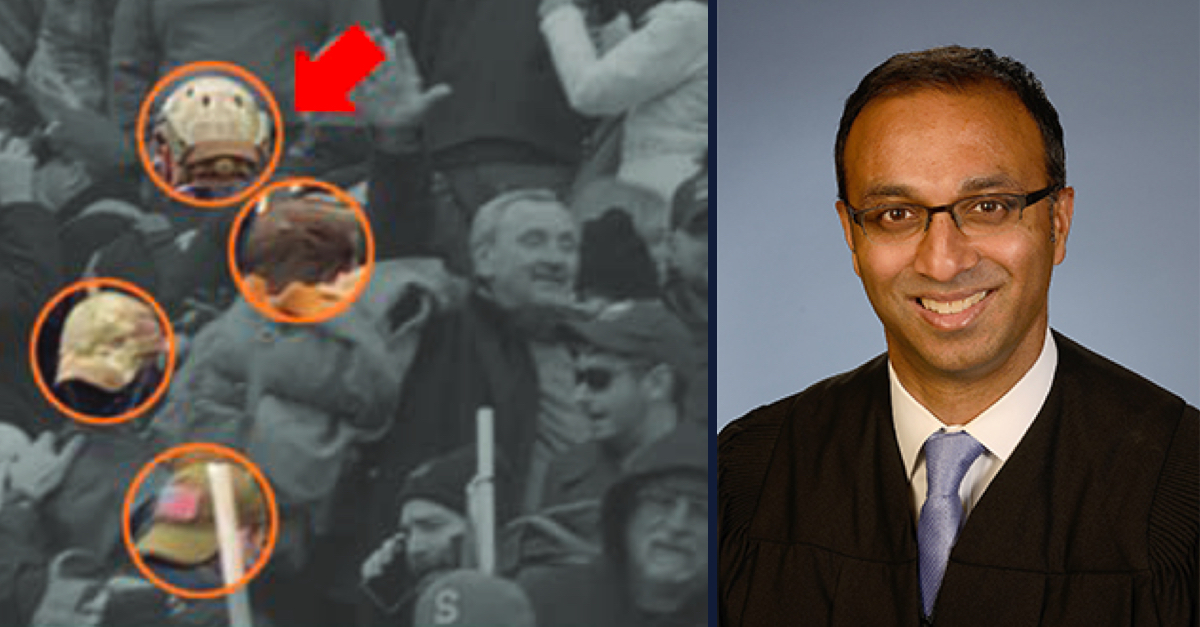
Members of the Oath Keepers allegedly approach the Capitol in “stack” formation on Jan. 6, with the red arrow indicating Kelly Meggs (via FBI court filing); U.S. District Judge Amit Mehta (via U.S. District Court for the District of Columbia)
The judge overseeing the trial of members of the Oath Keepers facing seditious conspiracy charges addressed a handful of motions filed by defendants over the weekend, denying most of them in full and clearing the way for opening statements to begin.
U.S. District Judge Amit Mehta’s first order of business was to dismiss a request from Kelly Meggs to have a bench trial instead of a jury trial. In support of his argument, Meggs’ attorney Stanley Woodward said that the request was, essentially, a last-ditch effort to avoid what he alleges is a biased D.C. jury.
“In short, Mr. Meggs has exhausted every procedural avenue to avoid judgment by a jury he firmly believes is incapable of being fair and impartial given the gravity of the events of January 6, 2021,” Woodward had written in the motion. “Accordingly, he respectfully requests this Court permit him a bench trial.”
Noting that Meggs’ request, “coming on the day of trial … is late,” Mehta said that if he granted Meggs’ request, the effect would be a sort of hybrid bench and jury trial that would likely result in significant juror confusion, because Meggs’ four co-defendants would still have a jury trial.
This would create the existence of “multiple fact-finders” in the two cases, Mehta said, likely resulting in juror speculation instead of focusing on evidence.
Mehta that Meggs’ claim of jury bias is “not warranted,” using those claims as a jumping off point to deny the defendants’ renewed motion to change venue.
As promised by Caldwell attorney David Fischer at the end of jury selection last week, the defendants did indeed renew their motion to move the case out of Washington, claiming that the jury pool — as residents of the city where the Capitol siege took place — were so biased against the defendants that they could not possibly get a fair trial.
“The D.C. jury pool is prejudiced against the Oath Keepers, said the motion, filed on behalf of all the defendants by Meggs’ attorneys Stanley Woodward and Julia Haller. The motion cites “three (3) commissioned surveys, including one commissioned by the Federal Public Defenders, showing the prejudgment bias in the jurisdiction.”
Mehta, in denying the defendants’ prior motions to change venue, had said that the jury selection process would determine who would be able to be a fair and impartial juror, despite having indicated on the juror questionnaire that they had a degree of preconceived notions about the Oath Keepers’ role in Jan. 6.
On Monday, the judge said that that process worked.
“Zero — exactly zero — [jurors] said they had such strong opinions” of the Oath Keepers such that they couldn’t be impartial, Mehta said. “What we have here is a jury that, by and large, [has] no impressions of Jan. 6 [or] Oath Keepers. Not a single one of them.”
Mehta noted that the intense questioning of jurors — by him as well as prosecutors and defense lawyers — means that the process worked.
“What that means is that voir dire has done its job,” the judge said.
The judge also said that he had “no fear” that the jury would abide by his instructions to avoid media coverage of the trial, a concern that Woodward had previously expressed.
Mehta also noted the motion’s reliance on various media articles — including a Law&Crime piece — as support that the jury members are biased, and said that their inclusion in the motion is unnecessary.
“I don’t know what purpose [the articles] serve,” the judge said. “I was actually here. I don’t need media articles to know what transpired.”
Mehta also denied a request from Meggs to delay the trial so that he could take the deposition of John L. Siemens, who Meggs says can testify that the Oath Keepers were lawfully in Washington to provide security for the events near Capitol grounds on Jan. 6.
On Monday, Mehta said that he could take up the issue of the deposition as trial progressed, but that he wasn’t going to delay trial because of it.
[Image via U.S. District Court for the District of Columbia]